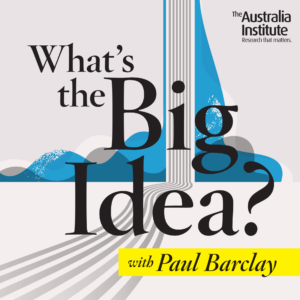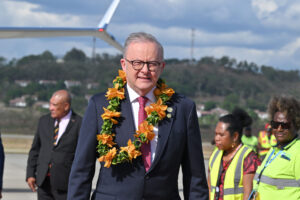Promoting a Free and Peaceful Indo-Pacific

Allan Behm’s address to the Australian Institute of International Affairs Korea Forum, Sydney on 15 April 2024.
We are meeting this morning on the lands of the peoples of the Eora Nation. May we respect and honour their elders, past and present, and express our admiration and gratitude for their custodianship of these beautiful lands that were never ceded.
I also express my appreciation to the AIIA for its initiative in convening this forum on Korea. It is a common failing, at least among members of the international and security affairs community, that we fail to see the wood for the trees. We are so deeply enmeshed in alliance management issues—and here we mean ANZUS—and other aspects of our defence relationship with the US—currently dominated by AUKUS—that we neglect the other critical factors that drive global and regional prosperity and security.
Our attention to the Pacific waxes and wanes: when it waxes, it is because of our preoccupation with some external factor, currently China. And when it wanes, which is most of the time, it is because we face budgetary pressures and so reduce the development assistance vote.
Similarly, our attention to Southeast Asia is characterized more by its downs than its ups: we effectively ignored the February elections in Indonesia, and the ASEAN summit recently held in Melbourne offered a remarkable opportunity for a pointed diplomatic rebuff by the Prime Minister of Malaysia who told us in no uncertain terms not to impose our Western strategic concerns on the region. They simply do not need our help or insights to manage their affairs. And the Summit communiqué oozed away from the meeting like an unsweetened blancmange.
Our bromance with India is curious. Political corruption is rife, social unrest is widespread, religious discrimination and intolerance (towards Muslims, Sikhs and Jains and Christians alike) is on the rise, the alienation and dispossession of the adivasis and harijans is even more entrenched as they lose their traditional lands to mining and industrialisation, and economic and social inequality is growing. All the while, India hunts with the foxes and runs with the hounds—if I may invert a familiar trope. It remains a friend of both Russia and America, and we appear to see no problem with that. Nor does America, apparently.
India is, of course, the western element of the Indo-Pacific binary—a binary so broad in its geographic, cultural, political and strategic scope as to be less than helpful in framing serious consideration of the determining dynamics of our region. Just how helpful is it to think about our world as extending from South Africa, Kenya and Tanzania to Chile and Peru. For Americans, given their exceptionalism and centrality, would not “Atlanto-Pacific” be more meaningful and useful?
Then, at least, Asia might enjoy a prominence at least commensurate with that of Europe in the echo-chambers of Washington. Australia’s preoccupations are properly dominated by economic and geo-political forces. Beyond “cricket, curry and Commonwealth” (code for a shared colonial history), India is yet to enter our foreign and security calculus as anything more than an enticing strategic possibility. It has been exactly that for at least half a century.
I begin with these worrying curiosities because they illuminate features of our national foreign policy mindset and frame our consideration of other significant matters. As befits a “lucky country run by second rate people who share its luck”, Australia’s foreign policy is too often distinguished by its complacency and condescension.
Cringeworthy Prime Ministerial references to “our Pacific family”—delivered in a city named after a slave trader—and indiscriminate references to “shared values” and “comprehensive strategic partnerships” serve only to cement our image as a lightweight of little regional or global importance. And only a naïve lightweight who knows nothing about pugilism can aspire to jumping into the ring and “punching above our weight”, the inevitable fate of which is to be comprehensively flattened.
That is why this forum is so important, because it forces us to address one of the real cornerstones of long-term strategic stability in Asia: The Republic of Korea.
As a leading geo-political and geo-strategic player in Asia, Korea is one of the most successful exponents of economic, security and cultural diplomacy not just regionally but globally. I might add that Japan is also a leading exponent of this art, for very similar reasons. From the deep geographic south, it is easy for Australia to look at Korea as a “front line state”, especially given our preoccupation with the China “threat”.
But which front line do we mean? There are so many of them as to make the expression pointless. Korea is strategically a central state, and as such plays a highly skilled diplomatic role in securing both its interests and its independence. And, by extension, we tend to view the Korean peninsula as an inevitable theatre of war, notwithstanding Korea’s avowed aim of avoiding that at almost any cost.
For two millennia, Korea has remained one of the cultural jewels of Asia. It has placed an enormous premium on its identity as a major asset in managing complicated and tricky relationships with its neighbours—China and Japan, obviously, and more recently Russia and Taiwan and, of course, its estranged fraternal neighbour, the DPRK. And here, like Iran, Vietnam, Iraq and Afghanistan, not to mention a number of central American states, Korea lives with the consequences of a signal failure in immediate post WW2 American strategy that is the ongoing division of the Korean Peninsula resulting from General MacArthur’s catastrophic misjudgment.
Like Japan, Vietnam, Cambodia, Laos and Thailand, and at various times Burma, it had a “tributary” relationship with China (we might say that Australia enjoys such a relationship with the US) where the costs and benefits focused on the maintenance of identity and independence. Over a span of two millennia, that is an achievement. There is much for Australia to think about and learn from Korea’s historical facility in managing both its survival and prosperity.
Korea is a model that is well worth Australia’s close study. It knows its neighbours well, and has developed formidable yet subtle skills in protecting and promoting its interests while managing the interests, pressures and contests with its neighbours. Because Korea is practised in identifying its interests and accommodating external pressures, it is able to maintain focus in realising its objectives. In particular, it is masterful in uniting its cultural, economic, political and social structures around a strong sense of national enterprise. Its chaebols are emblematic of that.
For Australia, Korea (like Japan and Vietnam) looms largely as a market for Australia’s coal and gas. The departmental briefing note for Resources Minister Madeleine King’s recent visit to Korea spells that out.
Beyond being an economic target, Korea is an enigma: a Confucian society that has grafted on a vibrant not to say rambunctious democracy—with all the tensions that attend popular political participation in any nation. But it is largely successful in balancing a strong focus on community with strong support for popular participation in national political processes, which is the core of democracy.
Korea demonstrates many of the key features of a successful, increasingly prosperous and increasingly influential modern polity. Without too much by way of explanation, these key features may be summarised as:
- Focus
- Independence
- A powerful sense of identity
- Strong self-belief
- A strong ability to self-affirm
- Diplomatic agility
- Shrewdness, especially in managing an alliance without generating assumptions
- Critically, an innate ability to preserve its agency and freedom of action.
This is an impressive list of qualities that have brought Korea to prominence as the twelfth biggest global economy—yes, bigger than Russia or Australia—and one of the key economic and strategic engines of Asia.
We can draw two lessons from this.
First, effective strategy is about how countries manage their immediate strategic environment, focusing on their clearly identified and articulated interests and less on the interests of others. The ability to accommodate is not about appeasement or concession. Rather, it is about the adroitness and skill with which national interests are advocated and secured, aligning the interests of neighbours without confronting them. That requires real diplomatic and political effort, and Korea is good at that.
Second, Western strategic theologies are tantalising, but not especially useful. Korea does not think much about the Indo-Pacific when it comes to planning its approach to strategic positioning. Nor does it appear to hanker after the Quad, itself a creature of the Indo-Pacific theology—as one wag put it, a platitude in pursuit of a policy. Korea maintains and protects a strong sense of cultural identity—and this includes strategic identity and posture—while at the same time preserving a clear sense of managed and realistic strategic ambition.
Finally, Korea’s historical experience and contemporary success as a strategic player is one that Australia could well emulate. In Asia, imperialism and colonialism are not coterminous. The strong and enduring “empires” of Asia—China, India, Japan, Thailand—have seen the western empires come and go. Greece, Rome, Spain, Portugal, Holland, France and Britain disappeared as quickly as they rose. They left their legacies, of course, for which some are grateful, and many are not. But the survival of the Asian “empires” may be more of a function of their concentration on internal cohesion than on the conquest of distant lands and the colonisation of peoples who neither wanted nor needed to be subjugated.
Korea’s longevity and its position as a strong, influential, diplomatically and economically successful Asian nation should inspire Australia constantly to maintain its focus on the things that create its own distinctive identity, that define its central values and, as a function of both identity and values, establish its enduring interests.
Fictions and fancies like “Indo-Pacific” may provide ballast to the conversation, and allow us to create temporary alignments like the Quad (which includes neither Indonesia nor Korea). But Korea shows us that the strategic real world is always our immediate neighbourhood.
Between the Lines Newsletter
The biggest stories and the best analysis from the team at the Australia Institute, delivered to your inbox every fortnight.
You might also like
Australia has power, why don’t we act like it? | Allan Behm
In a world of uncertainty, it is more important than ever for Australia to stop dismissing ourselves as a ‘middle power’ and start exerting our influence on the global stage.
Pacific nations have just delivered Australia two smackdowns. That’s a big deal.
We need to talk about the Pacific.
All the way with the USA?
Despite demands from the hawks that the Australia Government fall in line with the United States over Iran, it’s not inevitable that Australia supports illegal American military intervention.


